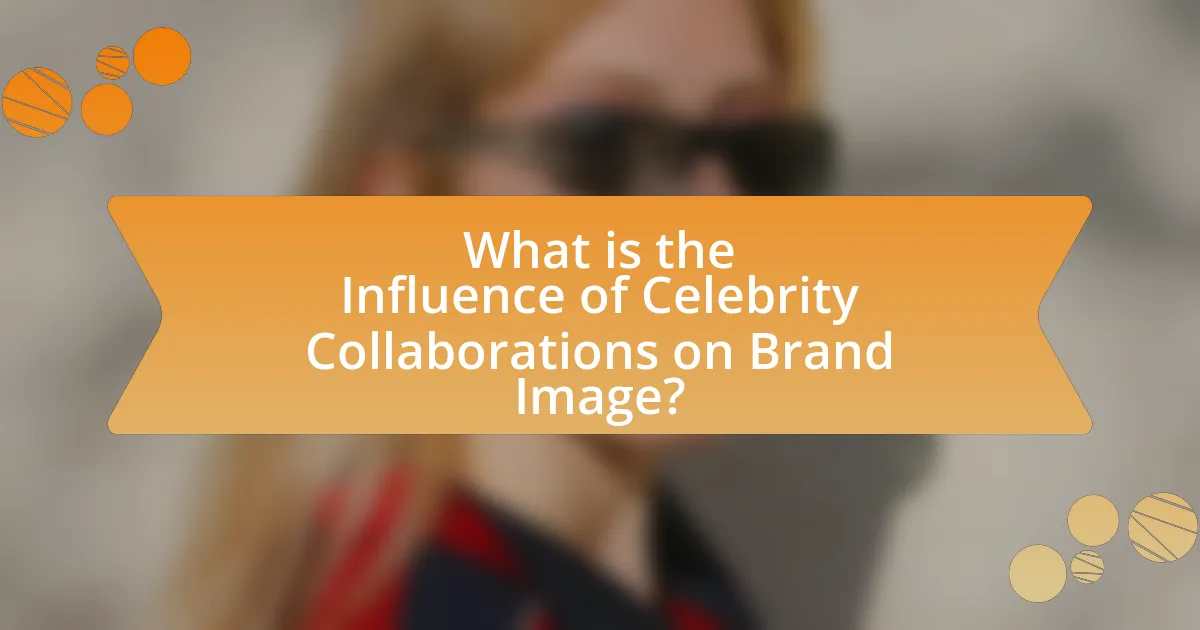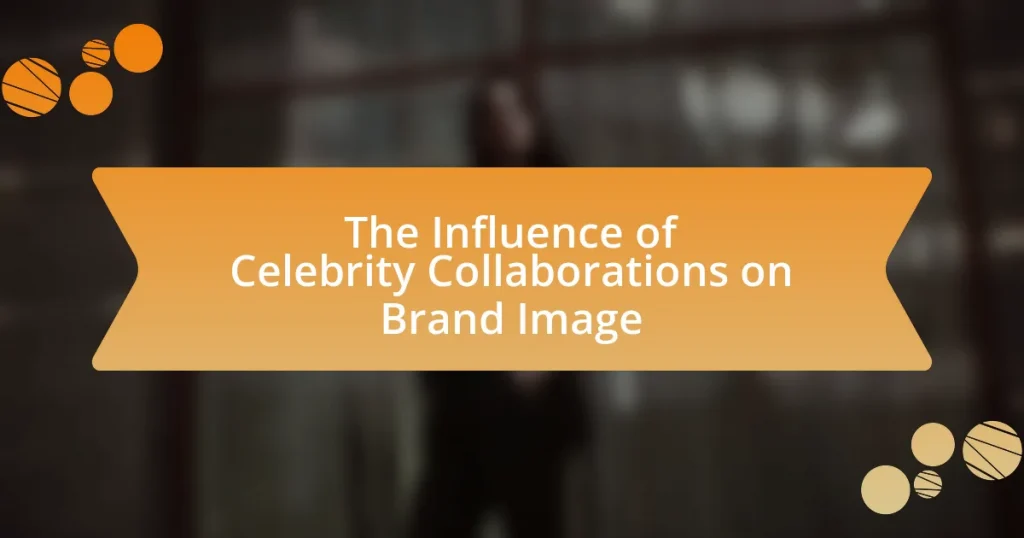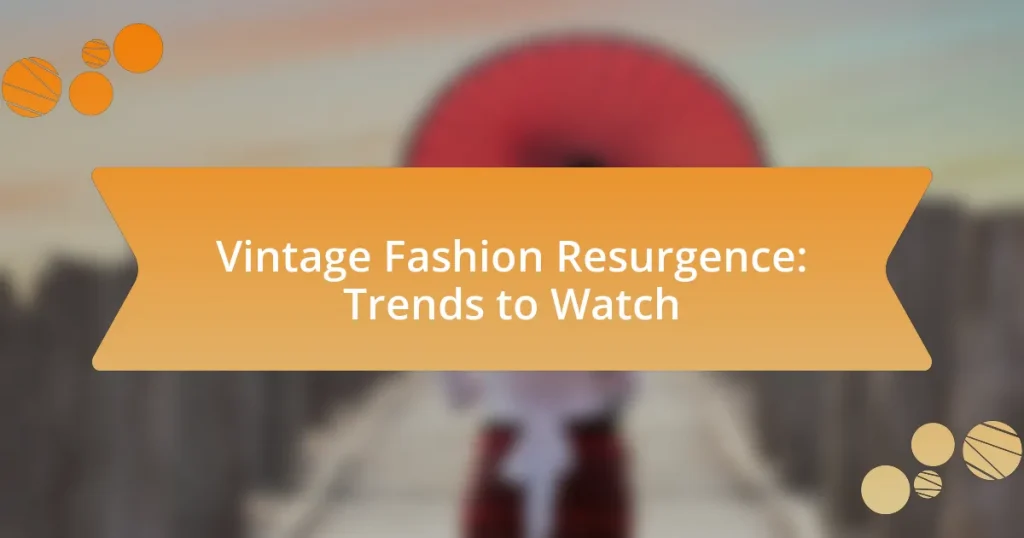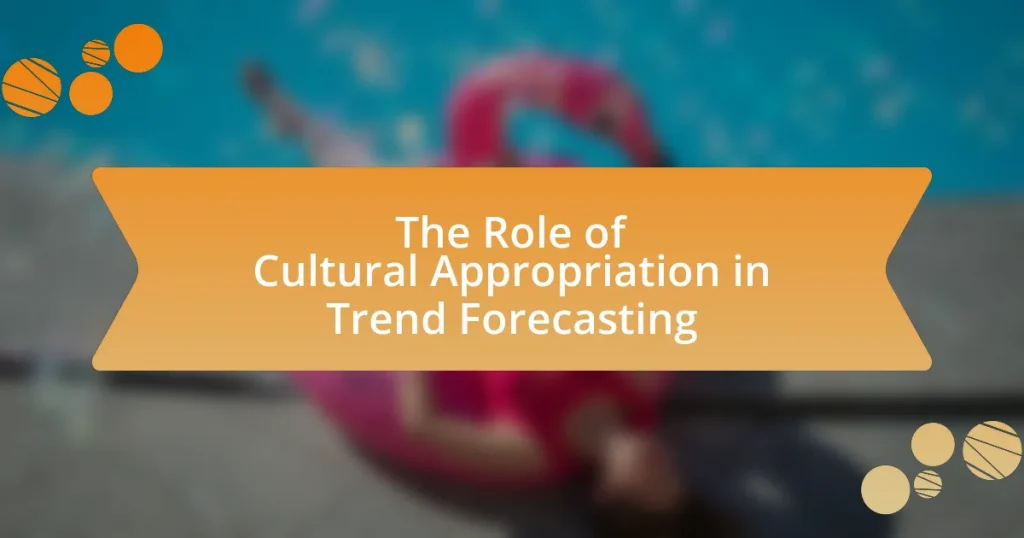The article examines the influence of celebrity collaborations on brand image, highlighting how these partnerships enhance visibility, consumer trust, and positive associations. It discusses the psychological factors that contribute to the effectiveness of celebrity endorsements, such as social proof and emotional connection, and explores various types of collaborations, including endorsements, co-branding, and social media partnerships. Additionally, the article addresses the challenges brands face, such as alignment of values and the risk of negative publicity, while outlining best practices for successful collaborations. Key metrics for measuring the impact of these partnerships on brand perception are also presented, emphasizing the importance of authenticity and alignment in fostering consumer loyalty.

What is the Influence of Celebrity Collaborations on Brand Image?
Celebrity collaborations significantly enhance brand image by leveraging the star power and credibility of the celebrity. When a brand partners with a well-known figure, it often experiences increased visibility, consumer trust, and positive associations. For instance, a study published in the Journal of Advertising Research found that brands endorsed by celebrities saw a 20% increase in brand recall and a 15% boost in purchase intent among consumers. This influence stems from the emotional connection fans have with celebrities, which can transfer to the brand, thereby improving its overall perception in the market.
How do celebrity collaborations impact consumer perception of brands?
Celebrity collaborations significantly enhance consumer perception of brands by leveraging the star power and credibility of the celebrity. When a well-known figure endorses a product, it often leads to increased brand awareness, positive associations, and heightened trust among consumers. Research indicates that 70% of consumers are more likely to purchase a product when it is endorsed by a celebrity they admire, as seen in a study published in the Journal of Advertising Research by authors such as McCracken and others. This phenomenon occurs because celebrities can evoke emotional responses and create aspirational connections, making the brand more relatable and desirable.
What psychological factors contribute to the effectiveness of celebrity endorsements?
Celebrity endorsements are effective due to psychological factors such as social proof, credibility, and emotional connection. Social proof occurs when consumers perceive a celebrity’s popularity as an indicator of a product’s quality, leading them to trust the endorsement. Credibility is established through the celebrity’s expertise or relatable persona, which enhances the perceived reliability of the product. Emotional connection arises when consumers identify with the celebrity, fostering a sense of loyalty and aspiration towards the brand. Research by Ohanian (1990) in the Journal of Advertising highlights that a celebrity’s attractiveness and trustworthiness significantly influence consumer attitudes and purchase intentions, validating these psychological factors.
How does brand alignment with a celebrity affect brand image?
Brand alignment with a celebrity positively affects brand image by enhancing credibility and relatability. When a brand partners with a well-known celebrity, it can leverage the celebrity’s reputation and fan base, which often leads to increased consumer trust and brand loyalty. For instance, a study published in the Journal of Advertising Research found that brands endorsed by celebrities experienced a 20% increase in brand perception compared to those without celebrity endorsements. This alignment can also create a stronger emotional connection with consumers, as they may associate the positive traits of the celebrity with the brand itself.
What are the different types of celebrity collaborations?
The different types of celebrity collaborations include endorsements, co-branding, product collaborations, and social media partnerships. Endorsements involve celebrities promoting a brand or product, leveraging their influence to enhance brand credibility; for example, Nike has successfully used endorsements from athletes like Michael Jordan to boost its image. Co-branding occurs when two brands partner to create a unique product, such as the collaboration between Adidas and Kanye West for the Yeezy line, which has significantly impacted both brands’ market presence. Product collaborations involve celebrities designing or creating products, like Rihanna’s Fenty Beauty, which has reshaped beauty standards and expanded market reach. Social media partnerships entail celebrities using their platforms to promote brands, as seen with influencers on Instagram, which can lead to increased engagement and brand visibility. Each type of collaboration effectively enhances brand image by associating it with the celebrity’s persona and reach.
What distinguishes endorsements from partnerships in celebrity collaborations?
Endorsements and partnerships in celebrity collaborations differ primarily in their nature and depth of engagement. Endorsements typically involve a celebrity promoting a product or service for a fee, focusing on the celebrity’s image to enhance brand visibility and credibility. In contrast, partnerships are more collaborative arrangements where the celebrity may be involved in the development, marketing, or strategic direction of the brand, often resulting in a deeper connection and shared values between the celebrity and the brand. This distinction is supported by the fact that endorsements are often transactional, while partnerships can lead to long-term relationships that influence brand identity and consumer perception.
How do co-branded products influence brand image?
Co-branded products significantly enhance brand image by leveraging the equity of both brands involved. When two reputable brands collaborate, they create a perception of increased quality and desirability, as seen in partnerships like Nike and Apple, which combined athletic performance with technology, resulting in a stronger market presence and consumer trust. Research indicates that co-branding can lead to a 20% increase in brand recognition and a 15% boost in consumer purchase intent, demonstrating the effectiveness of this strategy in shaping positive brand associations.
Why are celebrity collaborations becoming more prevalent in marketing strategies?
Celebrity collaborations are becoming more prevalent in marketing strategies because they significantly enhance brand visibility and consumer trust. Brands leverage the established fan base and credibility of celebrities to reach wider audiences and create emotional connections with consumers. Research indicates that 70% of consumers are more likely to purchase a product endorsed by a celebrity they admire, demonstrating the effectiveness of such partnerships in driving sales and brand loyalty. Additionally, the rise of social media platforms has amplified the impact of celebrity endorsements, allowing brands to engage with audiences in real-time and create viral marketing campaigns.
What trends are driving the rise of celebrity collaborations in branding?
The rise of celebrity collaborations in branding is primarily driven by the increasing consumer demand for authenticity and relatability. Brands leverage celebrities to enhance their image and connect with target audiences, as consumers often perceive celebrity endorsements as more trustworthy. According to a 2021 survey by Nielsen, 67% of consumers are more likely to purchase a product endorsed by a celebrity they admire, highlighting the effectiveness of these collaborations in influencing purchasing decisions. Additionally, the growth of social media platforms has amplified the reach and impact of celebrity partnerships, allowing brands to engage with consumers in real-time and create a sense of community around their products. This trend is further supported by the rise of influencer marketing, where celebrities act as influencers, driving brand awareness and loyalty through their personal narratives and lifestyles.
How do social media platforms enhance the effectiveness of celebrity collaborations?
Social media platforms enhance the effectiveness of celebrity collaborations by providing a direct and engaging channel for brands to reach their target audiences. These platforms facilitate real-time interaction between celebrities and their followers, amplifying brand messages through shares, likes, and comments. For instance, a study by the Journal of Advertising Research found that campaigns featuring celebrities on social media can increase brand engagement by up to 50%, demonstrating the significant impact of celebrity endorsements in digital spaces. Additionally, social media allows for targeted advertising, enabling brands to tailor their messages to specific demographics, which further increases the likelihood of successful collaborations.
How can brands measure the impact of celebrity collaborations on their image?
Brands can measure the impact of celebrity collaborations on their image through various metrics such as brand sentiment analysis, social media engagement, and sales performance. Brand sentiment analysis involves monitoring consumer perceptions before and after the collaboration, often using tools that analyze social media mentions and reviews to quantify changes in public opinion. For instance, a study by Nielsen found that 67% of consumers are influenced by celebrity endorsements, indicating a direct correlation between celebrity collaborations and brand perception. Social media engagement metrics, including likes, shares, and comments, provide insight into how well the collaboration resonates with the audience. Additionally, tracking sales performance during and after the campaign can reveal shifts in consumer purchasing behavior linked to the celebrity’s influence. These methods collectively offer a comprehensive view of how celebrity collaborations affect brand image.
What metrics are most effective for assessing brand image changes?
The most effective metrics for assessing brand image changes include brand awareness, brand perception, customer sentiment analysis, and social media engagement. Brand awareness measures how well consumers recognize a brand, often assessed through surveys or tracking studies. Brand perception evaluates consumer attitudes and beliefs about a brand, typically gathered through qualitative research methods like focus groups or interviews. Customer sentiment analysis utilizes natural language processing to gauge consumer feelings expressed in reviews and social media, providing insights into public opinion. Social media engagement metrics, such as likes, shares, and comments, reflect consumer interaction and can indicate shifts in brand image following celebrity collaborations. These metrics collectively provide a comprehensive view of brand image changes over time.
How can consumer feedback be utilized to evaluate collaboration success?
Consumer feedback can be utilized to evaluate collaboration success by analyzing customer perceptions and satisfaction levels regarding the collaboration. This feedback provides insights into how well the collaboration resonates with the target audience, influencing brand image and consumer loyalty. For instance, surveys and social media sentiment analysis can quantify consumer reactions, revealing whether the collaboration met expectations and enhanced brand perception. Research indicates that 70% of consumers are influenced by peer reviews and feedback, highlighting the importance of consumer input in assessing collaboration effectiveness.
What challenges do brands face when engaging in celebrity collaborations?
Brands face several challenges when engaging in celebrity collaborations, including alignment of values, risk of negative publicity, and high costs. Misalignment between a brand’s image and a celebrity’s public persona can lead to consumer confusion and brand dilution. For instance, if a celebrity becomes involved in a scandal, it can adversely affect the brand’s reputation, as seen with brands distancing themselves from celebrities like Kevin Spacey after allegations surfaced. Additionally, the financial investment required for celebrity endorsements can be substantial, with some deals reaching millions, which may not guarantee a proportional return on investment. These factors highlight the complexities brands must navigate in celebrity collaborations.
How can negative publicity surrounding a celebrity affect brand image?
Negative publicity surrounding a celebrity can significantly damage a brand’s image by creating associations between the negative behavior and the brand itself. When a celebrity endorses a product or service, their public perception directly influences consumer attitudes; for instance, a study by the Journal of Advertising Research found that negative news about a celebrity can lead to a decrease in brand trust and purchase intention by up to 30%. This decline occurs because consumers often transfer their negative feelings about the celebrity to the brand, leading to diminished brand loyalty and potential financial losses.
What strategies can brands employ to mitigate risks associated with celebrity partnerships?
Brands can mitigate risks associated with celebrity partnerships by conducting thorough due diligence on the celebrity’s public image and past behavior. This involves analyzing the celebrity’s social media presence, previous endorsements, and any controversies that may affect brand reputation. For instance, a study by the Journal of Marketing found that brands that partnered with celebrities who had a history of negative publicity experienced a 30% decline in consumer trust. Additionally, brands should establish clear contractual agreements that outline expectations and behaviors, including crisis management protocols. This proactive approach helps ensure that both parties are aligned and prepared to address any potential issues that may arise during the partnership.
What best practices should brands follow when collaborating with celebrities?
Brands should ensure alignment between their values and the celebrity’s image when collaborating. This alignment fosters authenticity, which is crucial for consumer trust and engagement. For instance, a study by the Journal of Advertising Research found that congruence between a brand and a celebrity can enhance brand recall and purchase intention. Additionally, brands should conduct thorough research on the celebrity’s audience demographics to target the right consumer segments effectively. Engaging in transparent communication about the collaboration’s goals and expectations can also mitigate misunderstandings and enhance the partnership’s success. Lastly, monitoring the collaboration’s impact through metrics such as social media engagement and sales performance is essential for assessing effectiveness and making necessary adjustments.
How can brands ensure alignment between their values and those of the celebrity?
Brands can ensure alignment between their values and those of the celebrity by conducting thorough research on the celebrity’s public persona, past actions, and statements. This involves analyzing the celebrity’s social media presence, previous endorsements, and philanthropic efforts to identify shared values. For instance, a brand focused on sustainability should collaborate with a celebrity known for environmental advocacy, as this alignment can enhance brand credibility and consumer trust. Studies show that 71% of consumers are more likely to purchase from brands that align with their personal values, highlighting the importance of this alignment in driving consumer behavior.
What role does authenticity play in successful celebrity collaborations?
Authenticity is crucial in successful celebrity collaborations as it fosters trust and relatability between the celebrity and the audience. When a celebrity genuinely aligns with a brand’s values and message, it enhances the perceived credibility of the collaboration, leading to increased consumer engagement and loyalty. Research indicates that 86% of consumers consider authenticity important when deciding which brands to support, demonstrating that authentic partnerships can significantly impact brand image and consumer perception.



